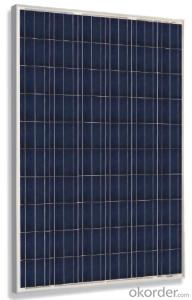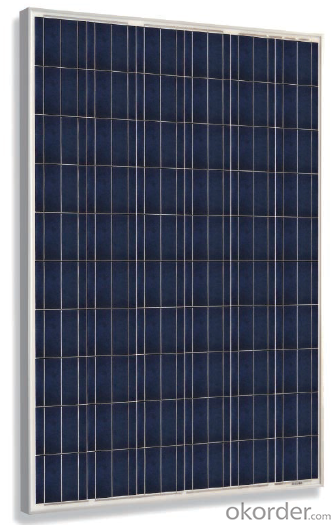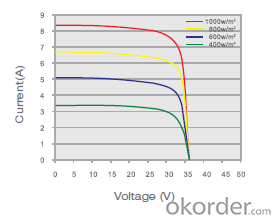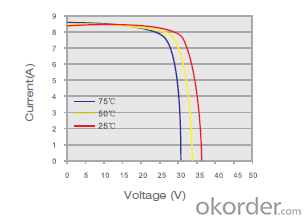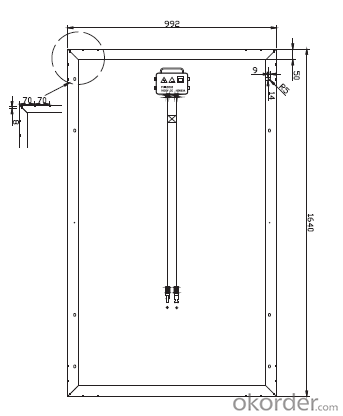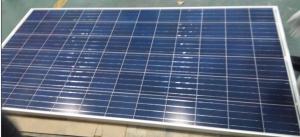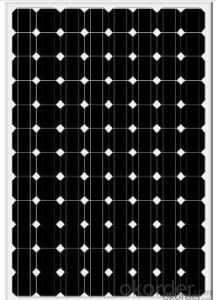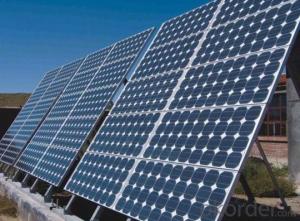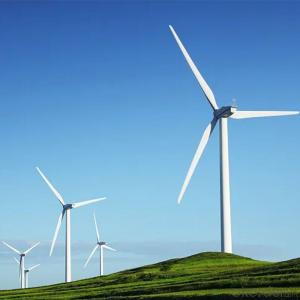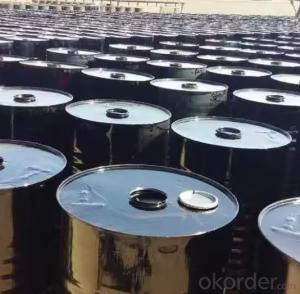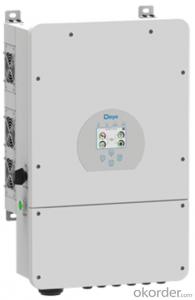Polycrystalline Solar Module SP660-245W
- Loading Port:
- Shanghai
- Payment Terms:
- TT OR LC
- Min Order Qty:
- 25 set
- Supply Capability:
- 8000 set/month
OKorder Service Pledge
OKorder Financial Service
You Might Also Like
Product Description:
1.Structure of Polycrystalline Solar Module SP660-245w Series Description:
Polycrystalline Solar Module SP660-245w : High efficiency crystalline solar cell. Even if under the weak light, the solar module can produce maximum power output.
II Tempered glass (toughened glass): Anti-reflecting coating and high transmission rate glass increase the power output and mechanical strength of solar module.
III EVA and TPT: Using high quality EVA and TPT to prevent destroying and water.
IV AI frame: Without screw, rner connection. 6 holes on the frame can be installed easily.
V Junction box: Multi function junction box with water proof.
VI Long lifetime: ≥25 years; Less power decrease.
VII Good performance of preventing from atrocious weather such as wind and hails.
VIII Resisting moisture and etching effectively, not effected by geology.
IX The certificate issued by international authority: TUV, IEC, CE.ISO9001.MCS
2. Standard Test Conditions of Polycrystalline Silicon Solar Panel:
The opto-electrical specifications shown below are stabilized values being measured at Standard Test Conditions, Irradiance: 1000W/m2, Spectrum: AM1.5 at 25°C, The info below is subject to manufacturing tolerances. Where appropriate minutes of measurement are available and are used for the dimensioning of the installation.
Advantages of Polycrystalline Silicon Solar Panel
• 25 year transferrable power output warranty: 10 years / 90%, 25 years / 80%*
• 12 year material and workmanship warranty
• Timeliness of delivery
• Quality Products certified (TUV, IEC, CE.ISO9001.MCS)
3. Characteristics of PolycrystallineSilicon Solar Panel:
• Guaranteed tolerance +3%
• High manufacture standards
• Reliable power output
• High module efficiency
• Module efficiency up to 15.5%
• Cells efficiency up to 17.6%
• Strong compressive strength
• Certified to withstand high wind of 2400Pa
4. Solar Panel Images
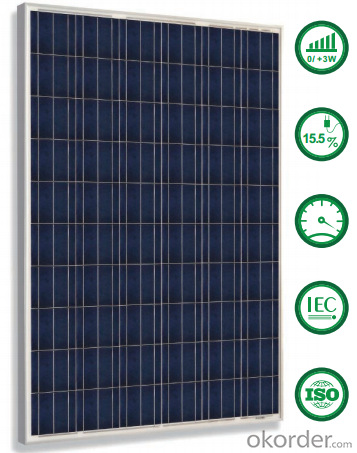
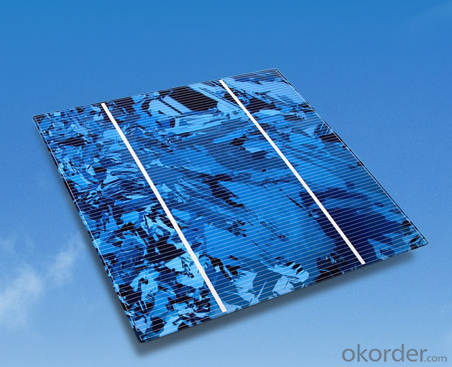


5. Polycrystalline Silicon Solar Panel Specification
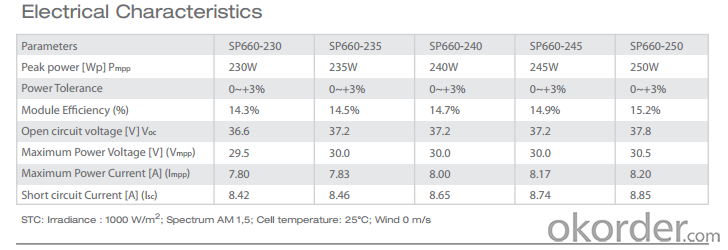
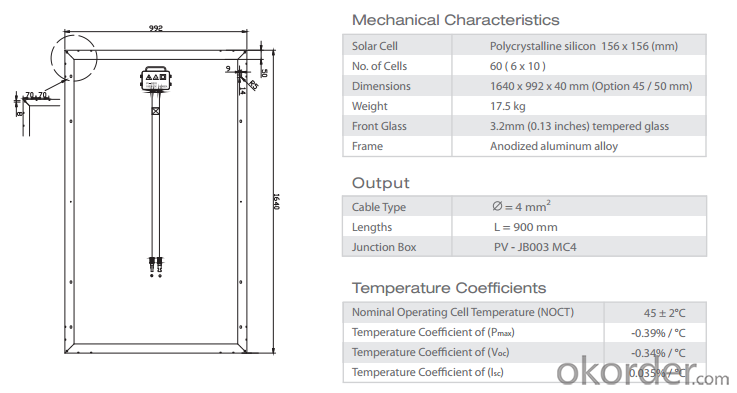


6.FAQ
We have organized several common questions for our clients,may help you sincerely:
①How about your company?
We are a private-owned high-tech company who specializes in developing, manufacturing and marketing of silicon ingots, solar wafer, solar cells, solar modules, PV systems and solar applications products.
At present, We has one research & development team, whose members are well-known experts in photovoltaic area. We also have advanced production and test equipment.
②How to guarantee the quality of the products?
Our products have been certified by CE, CEC,MCS, IEC61215, IEC61730 and ISO9001.
• 25 year transferrable power output warranty: 10 years / 90%, 25 years / 80%*
• 12 year material and workmanship warranty
• Timeliness of delivery
• Quality Products certified (TUV, IEC, CE.ISO9001.MCS)
③How long can we receive the product after purchase?
In the purchase of product within three working days, We will arrange the factory delivery as soon as possible. The pecific time of receiving is related to the state and position of customers.Commonly 7 to 10 working days can be served.
- Q:Can someone tell me if I can run a air conditioner off solar panel?I have a ET-P65420 20Wp solar panel. What do I need to make it work? I am told I will need a Enphase Energy Microinverter M20. Is that true? I am looking to run a 5000 to 8000btu air conditioner to a max of 0000btu air conditioner. I need to cool a 0x30 space. One time I read, I need total watts of panel to match total watts of air conditioner. Then I read, that I do not and can run more watts then what the panel is depending on the inverter and batteries.Can someone tell me what and how to make this work please? More panes or inverter and batteries?
- You can expect such an air conditioner to use something like 500 - 800 watts of power. The ET-P65420 20Wp solar panel produces at most 20 watts so you will need at least three of them. Since solar cells make DC (Direct Current) electricity, and air conditioners use Alternating Current (AC) electricity, you do need an inverter. The M20 is a 220 volt inverter, and I suspect you are looking at a window air conditioner that will probably use 0 volt power. And the M20 only puts out a maximum of 240 watts so you need one for each of the 3 or more solar panels you will have to use. So the first thing to do is shop for air conditioners, getting the most energy efficient model you can find, paying close attention to the voltage and wattage ratings in the owner's manual or on the UL label on the back. Say it is a 500 watt, 0V unit. You will need three solar panels and three 0 volt model inverters. Also note that the 20 watt rating of the solar panels if when the panel is facing DIRECTLY at the Sun. If you just lay them on the roof, then even if the roof is sloped at a good angle (30 degrees) and facing south, it will only produce the maximum power around noon. 4 hours before noon, unless to go up there and tip them up to face the morning Sun they will probably produce only about half that amount of power. So right there you either need a motorized mount to automatically follow the Sun or twice as many panels. However, if you are going to connect the solar panel(s) into the house power, so that it(they) merely supplement the power company power, then you can use any amount of panels, and the power company will supply whatever extra power you need. That requires a licensed electrician to do. Or if you want to just power the air conditioner directly from the solar panels without any interconnection to the house power, then you need to know a lot more about electricity that you appear to know.
- Q:My washer is 20 volts 60 gz,9.6 amps. The solar panels I am looking at are: Sharp ND-208U Solar Panels (208 Watt) List Price $,479.99 Only $,049.99 Sharp Solar Panels (208 Watt) List Price $,352.99 Only $,040.99 If I buy that will it be enough to run my washer?
- Solar panels produce power in proportion to the amount of sun light and inverse proportion to the temperature. To use solar power you will need in addition to the panels a bank of batteries a charge controller and an inverter to convert to 20v. The panel(s) will only be used to recharge the batteries and the batteries connected to the inverter is what is going to run your washing machine. You therefore need to know how long is the machine going to run, how often and how much charging can you expect to get from each panel in order to figure out how many panels you will need and how many batteries. If you do only one load very infrequenly, you will be able to use a smaller battery bank and charge at a lower rate.
- Q:how efficient are flexible solar panels?
- One I got about 3 years ago is about 50% as efficient as a glass panel I got about 0 years ago. Not exactly a scientific study, I know.
- Q:Can solar panels be used for agricultural purposes?
- Yes, solar panels can be used for agricultural purposes. They can provide power for various agricultural operations such as irrigation systems, livestock watering, grain drying, and greenhouse heating. Additionally, solar panels can help farmers reduce energy costs and dependence on fossil fuels, making them a sustainable and environmentally friendly solution for the agricultural sector.
- Q:Can solar panels be installed on a military base or facility?
- Yes, solar panels can definitely be installed on a military base or facility. In fact, many military bases around the world have already adopted solar energy as a means to reduce their reliance on fossil fuels and increase their energy independence. Solar panels can be installed on rooftops, parking lots, or open fields within the base, providing a sustainable and reliable source of clean energy. The use of solar panels on military bases not only helps to reduce carbon emissions but also enhances the resiliency and security of the base's energy infrastructure.
- Q:Ok so if i wanted to put a solar panel on my house and i live where it snows, will that be a problem? If the snow covers the solar panel will that be a problem? If so then do i have to climb on my roof and clear it off or what?
- In my experience the snow usually slides off by itself. There have been times when it's snowed heavily and I've had to clean it off but it does not tend to be the norm.
- Q:Can solar panels be installed in a remote location?
- Yes, solar panels can be installed in a remote location. In fact, remote locations with abundant sunlight can be ideal for solar panel installations as they can generate electricity even without access to a traditional power grid. The advancements in solar technology and the ability to store excess energy in batteries make it easier to set up and maintain solar systems in remote areas.
- Q:Can solar panels be used in areas with frequent lightning storms?
- Yes, solar panels can be used in areas with frequent lightning storms. However, it is recommended to take certain precautions to minimize the risk of damage. These precautions include installing surge protection devices, grounding systems, and lightning arrestors to divert the lightning strike's energy away from the solar panels. Additionally, using high-quality equipment that meets safety standards can also help mitigate potential damage caused by lightning strikes.
- Q:I been considering to get a solar panel system but I don't know if I'm going cut my electric bill every month , It's a lot of money to spend and I'm not really sure
- I'm waiting for the gov't to do right thing and subsidize my purchase!
- Q:I contend:As far as the solar panels causing global warming I'll try to explain. If you put a black panel on the ground or on your house and don't connect it to anything, it will absorb solar energy (heat) during daylight and release it at night (radiation). The net heat gain is zero. If you hook up a solar panel in the same place but hook it up to batteries, charge the batteries during sunlight hours and using that energy to electrically heat the home at night. The panels will absorb solar energy during the day but will convert that to electrical energy in the batteries instead of radiating it back into space at night. The result is a net gain in earth's temperature.Right or wrong?
- Third Law of Thermodynamics (in normal speak): “Not only can you never get ahead, you can’t even break even.” This is a truism that applies to all activities involving energy exchange (and almost everything else as well). Energy in the form of solar radiation falls on the earth. That energy is absorbed by the planet (everything) and heat results. Some portion of that energy is lost in the absorption process and the net released as heat is less than that absorbed from the sun. This is true in all cases. Solar panels, both photovoltaic and heat collectors are subject to the Third Law and they all lose some of the radiant energy striking them in the process of converting that energy into either hot water (or whatever fluid) or electrical energy. Regardless of the process there is always a net loss of energy. The time delay you mention has no bearing on the total heat gain or loss for the planet. In fact the “solar panel effect” reduces the net energy put back into the ecosystem because it introduces another iteration of energy loss through conversion. The Holy Grail of energy conservation it the ability to use, store or recover the entire amount of energy produced regardless of the source of that energy, burning hydrocarbons, geothermal heat exchange, solar radiation, mice on treadmills …..all forms of energy suffer a net loss in any exchange! If we could avoid that loss we could dramatically reduce the heat lost into the atmosphere or ground water and our net energy gain would also be dramatic! Check out the super cooled circuits in use to reduce resistance in sophisticated electronic equipment for a good example of the energy savings. (Of course the savings do not account for energy lost in the cooling process. In any event NO….. solar panels do not contribute to global warming via their operation. (Their manufacture is another story altogether!)
1. Manufacturer Overview |
|
|---|---|
| Location | |
| Year Established | |
| Annual Output Value | |
| Main Markets | |
| Company Certifications | |
2. Manufacturer Certificates |
|
|---|---|
| a) Certification Name | |
| Range | |
| Reference | |
| Validity Period | |
3. Manufacturer Capability |
|
|---|---|
| a)Trade Capacity | |
| Nearest Port | |
| Export Percentage | |
| No.of Employees in Trade Department | |
| Language Spoken: | |
| b)Factory Information | |
| Factory Size: | |
| No. of Production Lines | |
| Contract Manufacturing | |
| Product Price Range | |
Send your message to us
Polycrystalline Solar Module SP660-245W
- Loading Port:
- Shanghai
- Payment Terms:
- TT OR LC
- Min Order Qty:
- 25 set
- Supply Capability:
- 8000 set/month
OKorder Service Pledge
OKorder Financial Service
Similar products
New products
Hot products
Hot Searches
Related keywords
